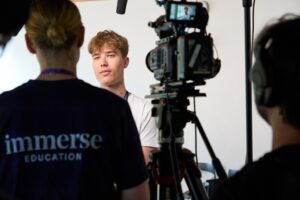About 77% of people admit they fear public speaking, but learning how to be a confident speaker isn’t about removing fear. It’s about transforming it into focus and storytelling power.
TED speakers show that calm, authentic delivery comes from preparation, not perfection. Through the TED mindset, anyone can learn to communicate with clarity and connection.
At our TED Summer School, you’ll explore how storytelling transforms nerves into confidence and ideas into impact, helping you speak with assurance in every setting.
In this article, you’ll discover why confidence matters more than perfection, how storytelling builds presence, and practical TED-inspired steps to strengthen your voice every time you speak.
Why Confidence Matters More Than Perfection
Confidence matters more than perfection because your audience connects with sincerity, not flawlessness. Perfection creates pressure, while confidence builds presence.
Understanding how to be a confident speaker starts with caring about your message more than your mistakes. When you focus on what you want to share, rather than how you appear, your delivery becomes more natural and engaging.
As Chris Anderson, curator of TED, notes, powerful speakers prioritise clarity of purpose. They communicate ideas that matter, not memorised lines. This clarity helps calm nerves and centres you on what’s essential: connection.
Psychologist Brené Brown, in her talk “The Power of Vulnerability,” reminds us that vulnerability is a form of strength. By embracing imperfection, you show authenticity and courage, which invites trust from your listeners.
Confidence isn’t about having all the right words. It’s about being grounded, open, and present enough to let your ideas flow. When you value communication over control, your audience feels your message rather than your mistakes.
The Psychology of Speaking Confidence
Confidence is like a muscle; it strengthens through use, not avoidance. The first time you speak in front of others, it might feel unsteady, like lifting a weight just beyond your comfort zone. With each attempt, your mind learns balance, your breath steadies, and your message grows stronger.
Speaking confidence isn’t about eliminating nerves; it’s about training your thoughts and body to work with them. Once you understand the mechanics behind that tension, you can turn anxiety into energy and self-doubt into focus.
- Recognise nerves as energy, not danger. When your heart races, it’s your body preparing to help you perform. Channel that energy toward your message.
- Use breathing to steady your focus. Controlled breathing signals calm to your body. A calm breath supports a clear voice and steady rhythm.
- Adopt a growth mindset. Confidence develops through repetition and curiosity, not perfection. Each speaking opportunity strengthens self-trust.
- Focus on purpose, not polish. Confidence grows when you care more about what you’re saying than how you appear to be saying it.
- Turn vulnerability into connection. Honesty and authenticity invite empathy from your audience.
- Reflect after every talk. Identify one strength and one area to improve. Growth compounds through awareness.
Confidence is built the same way stories are told, through rhythm, patience, and courage to keep going. Learning how to be a confident speaker means recognising that nerves are energy, not barriers. The more you practise, the more natural your voice becomes.
How to Become a Better Speaker (10 Practical Tips)
Confidence grows through action. Every confident speaker you admire started by taking small, deliberate steps to improve how they communicate. Practice turns insight into instinct.
The following ten tips will help you strengthen your voice, sharpen your storytelling, and find calm in every speaking moment.
Tip 1: Know Your Message
Confidence begins with clarity. When you know exactly what you want to say, you speak with purpose instead of fear. Uncertainty breeds hesitation; clarity builds calm.
TED curator Chris Anderson explains that powerful speakers start with a clear idea worth sharing. Once you know your message and why it matters, every example, pause, and sentence supports that purpose.
Before you practise your delivery, define your core message in one or two sentences. Ask yourself: What do I want my audience to remember?
The clearer your answer, the more confident your voice becomes. This clarity is the foundation of how to be a confident speaker in any setting.
Tip 2: Use Storytelling to Connect
Picture this: a speaker walks on stage, skips the slides, and begins with, “When I was sixteen, I almost gave up on my dream.” Instantly, the room quiets. Everyone leans in.
That’s the power of storytelling. It captures attention not through facts, but through feeling. Stories create empathy, turning ideas into experiences that people remember.
In his TED Talk, The Power of Storytelling, Jeff Gothelf explains that stories make complex ideas relatable by anchoring them in emotion. When you share something genuine, such as a mistake, a moment of learning, or a simple realisation, your message becomes unforgettable.
Confidence grows when you stop performing and start connecting. Tell stories that sound like you, and your voice will always find its rhythm.
Tip 3: Practise Out Loud
Confidence grows through repetition. The more you hear your own voice, the more natural it feels to use it. Silent preparation builds knowledge, but spoken practice builds ease.
Communication coach Lawrence Bernstein suggests the “coffee shop test”: rehearse your talk as if you were chatting with a friend across a table. This relaxed approach helps you focus on conversation rather than performance, making your tone more genuine.
Practising out loud also helps you find rhythm and pacing. Record yourself, listen back, and notice where your message flows or falters. Every rehearsal builds familiarity, and familiarity becomes confidence. This simple habit is one of the most effective ways to master how to be a confident speaker.
Tip 4: Visualise Success
“Whatever the mind of man can conceive and believe, it can achieve.” — Napoleon Hill
Confidence begins in belief. When you imagine yourself speaking with clarity and calm, you train your mind to accept success as possible. Visualisation works because it bridges thought and action—your brain starts preparing your body for what it expects to happen.
Professional athletes, musicians, and leaders use this technique before big moments. By picturing their performance vividly, they reduce uncertainty and increase focus. Speaking works the same way.
Before your next talk, close your eyes and see yourself succeeding. Visualisation is mental rehearsal; it transforms nervous energy into readiness and belief into confident action.
Tip 5: Control Your Breathing
Breath is the foundation of calm. When your breathing is steady, your voice follows, and your confidence grows with it.
In her TEDx Talk “Art of Breathing,” Tina Sodhi explains that slow, mindful breathing activates the body’s relaxation response, helping you release tension and stay present while speaking. A calm body supports clear thinking and steady communication.
Before you speak, inhale slowly for four counts, hold briefly, and exhale for six. This simple rhythm grounds you in the moment and steadies your tone.
Every confident speaker learns to breathe between ideas rather than rush between sentences. Stillness between words is not silence; it is composure.
Tip 6: Focus on Your Audience
Have you ever noticed how your nerves disappear the moment you start helping someone else? The same principle applies to speaking. When you focus on your audience instead of yourself, confidence naturally replaces fear.
Great speakers listen as much as they talk. They notice reactions, adjust their tone, and read the room to keep their audience engaged. This awareness turns a presentation into a conversation.
Before you speak, remind yourself that your goal is to connect, not to perform. When your words serve others, your confidence grows from empathy, not ego.
Tip 7: Embrace Imperfection
Confidence is like art.. It’s the small imperfections that make it beautiful. Look closely at Van Gogh’s swirling brushstrokes in Starry Night or the visible cracks in da Vinci’s Mona Lisa. Their brilliance lies not in precision but in emotion and depth.
In her TED Talk, The Power of Vulnerability, Brené Brown reminds us that authenticity builds trust. Audiences don’t connect with flawless delivery; they connect with honesty and courage. When you accept imperfection, you permit others to do the same.
Instead of chasing perfect phrasing, focus on staying present. Speak as you are, not as you think you should be. The more real you sound, the more confident you become.
Tip 8: Use Body Language to Reinforce Your Words
Imagine standing before an audience with your shoulders open, feet grounded, and hands calm at your sides. Before you even speak, your body has already told the room you’re confident and ready.
Body language is the silent partner of communication. Posture, gestures, and eye contact all influence how your message is received. Open movements create warmth and trust, while fidgeting or crossing your arms can signal uncertainty.
A 2025 study shows that speakers who maintain open posture and purposeful gestures are perceived as more credible and their messages clearer. Your body communicates confidence long before your words do.
Practise standing tall and relaxed when you speak. Let your gestures match your words naturally. Confidence isn’t only heard; it’s seen.
Tip 9: Practise Positive Self-Talk
What you tell yourself before you speak often decides how confidently you’ll sound. If your inner voice says, “I’m not ready” or “I’ll mess up,” your body believes it. But when you change the story, you change your presence.
Psychologist Carol Dweck’s research on the growth mindset shows that believing you can improve transforms performance and resilience. The same applies to speaking. Replace self-doubt with self-direction. Tell yourself, “I’m prepared, and I have something worth saying.”
Confidence starts in the mind. Speak to yourself with the same encouragement you’d offer a friend. Your words shape your mindset, and your mindset shapes your delivery.
Tip 10: Reflect and Learn From Every Talk
Confidence grows through reflection. Every time you speak, whether it’s a class presentation, a debate, or a short introduction, you gain insight into how you communicate.
After each talk, take a few minutes to note what felt strong and what could improve. This isn’t self-criticism; it’s self-awareness. The best speakers refine their style by noticing patterns and learning from each experience.
Progress doesn’t come from avoiding mistakes but from understanding them. Each reflection is a quiet rehearsal for the next time you speak, turning experience into skill and repetition into confidence.
At our TED Summer School, you’ll put these principles into practice, learning to combine storytelling, clarity, and presence through interactive sessions and real feedback.
Join the Immerse Education 2025 Essay Competition
Follow the instructions to write and submit your best essay for a chance to be awarded a 100% scholarship.

Interactive Confidence Builder: The 5-Day “Mini TED” Challenge
Confidence doesn’t appear in a single moment. It builds through repetition, reflection, and the courage to share your voice. This five-day challenge will help you practise that process—one small, meaningful step each day.
Day 1: Find Your Story – Think about a personal experience that taught you a lesson or changed your perspective. It could be a challenge, a success, or a moment that made you see something differently.
- Do this: Write one short paragraph describing what happened and what you learned.
Day 2: Shape Your Message – Every TED Talk is built around one clear idea. What’s yours? Look back at your story and find a single sentence that captures the main message.
- Do this: Write your “idea worth sharing” in one line—something simple, memorable, and meaningful.
Day 3: Practise Out Loud – Speaking transforms writing into communication.
- Do this: Record yourself telling your story in one minute using your phone or laptop. Don’t aim for perfection; focus on flow. Listen back and note one part that sounds strong and one that feels uncertain.
Day 4: Add Emotion and Body Language – Your body communicates as powerfully as your words.
- Do this: Practise telling your story again, this time in front of a mirror or camera. Notice your tone, gestures, and facial expression. Experiment with open posture and steady eye contact.
Day 5: Share and Reflect – Confidence grows when you share your story with others.
- Do this: Present your story to a friend, classmate, or family member. Ask them what moment caught their attention most. Afterwards, write down how you felt before, during, and after speaking.
By the end of five days, you’ll have a story shaped, spoken, and strengthened through practice. Each step helps you turn reflection into expression and ideas into confidence.
Building Confidence Through Immerse Programmes
Confidence doesn’t appear overnight; you develop it through practice, feedback, and community. At Immerse, you’ll explore how to be a confident speaker through learning, discussion, and storytelling. Our summer programmes are designed to help you grow these qualities by creating and communicating in environments that nurture confidence from within.
At our Oxford Summer School, you’ll build confidence through the art of dialogue. Oxford’s tradition of debate and discussion encourages clear thinking and composed expression.
In small, tutor-led seminars, you’ll learn to articulate ideas persuasively, respond thoughtfully, and speak with poise. Beyond the classroom, moments like punting on the River Cherwell or exploring historic colleges give you chances to share, listen, and connect with peers from around the world.
At the Media & Journalism Summer School, you’ll develop confidence through storytelling and communication. Guided by experienced journalists and academics, you’ll practise shaping narratives, leading interviews, and presenting stories that express truth with clarity. Every workshop helps you refine your voice and share your ideas with assurance.
At Immerse, you’ll learn that confidence doesn’t mean being perfect; it means being prepared, aware, and willing to speak with purpose. You’ll leave not only as a better communicator but as someone ready to lead conversations that matter.
Becoming a Confident Communicator with TED × Immerse
Learning how to be a confident speaker begins with understanding yourself, your message, and your audience. Confidence doesn’t mean being perfect; it means being prepared, present, and authentic.
Every great communicator shares one truth: clarity builds calm, and connection builds confidence. When you focus on sharing ideas that matter, your nerves transform into energy and your words find their rhythm.
At our TED Summer School, you’ll explore how to speak with conviction through storytelling and purposeful communication. You’ll learn to combine calmness, creativity, and clarity, the same qualities that define confident speakers around the world.
Your voice has value, and your story has power. Start sharing it today.



















